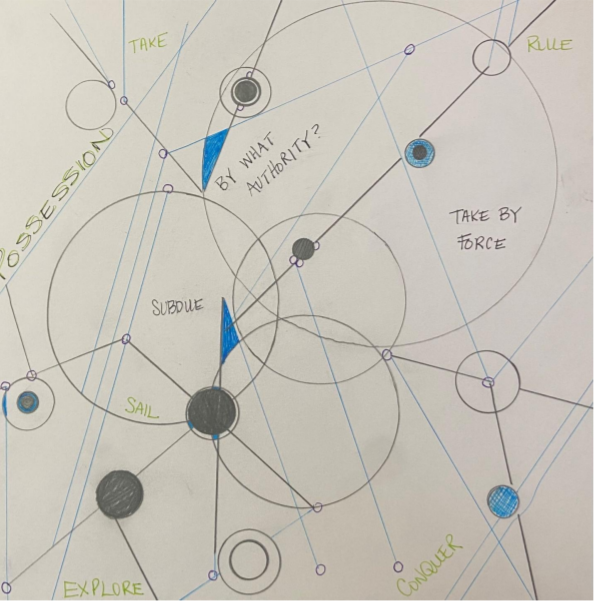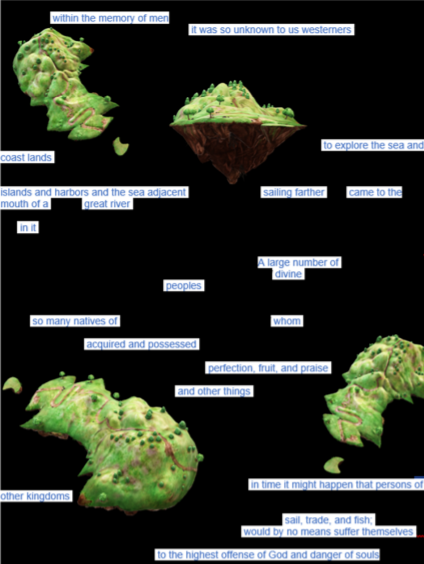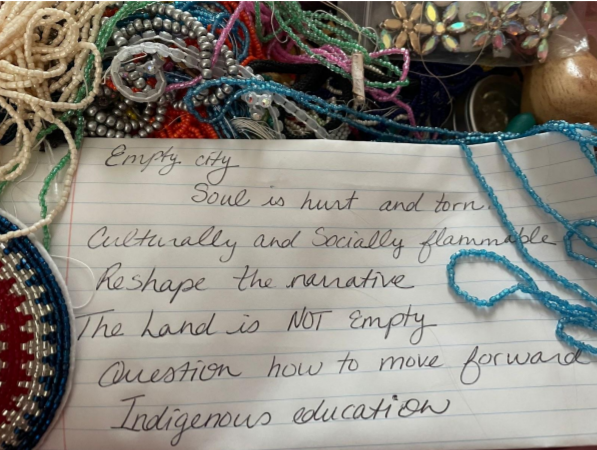When: November-December, 2021
Where: Oklahoma, USA
Facilitator: Justin Hu
Text: Romanus Pontifex. In 1455, Pope Nicholas V issued Romanus Pontifex to King Alfonso V of Portugal
The motivating goal for having this Pre-Text workshop was to support Native American civic engagement and historical sovereignty. The group of Native American educators, students, cultural heritage professionals, and community members hoped to explore artful, meaningful, and community-based alternatives for educational settings to confront the harm and lasting legacies of the Doctrine of Discovery and to promote respectful, just, and community-based knowledge of Native American history and culture. The event was supported by the Harvard Internship Program (HIP), which sponsored the facilitation by the outstanding Intern Justin Hu.
The workshop participants were a NAGPRA Liaison for The Choctaw Nation of Oklahoma; an Elder of the Caddo and Wichita Nations; a Coordinator for the Choctaw Nation of Oklahoma Environmental Protection Services; a history teacher at Cherokee High School; a Fine Artist who is an enrolled citizen of the Choctaw Nation of Oklahoma; the Director of Student Programming and Research at the American Indian Graduate Center; a Cultural Technician of the Seminole Nation of Oklahoma; and a Historic Preservation Specialist of the Tribal Historic Preservation Office for the Eastern Band of Cherokee Indians. Other educators, students, and heritage professionals participated in the planning but were unable to attend the workshop sessions.
The workshop planning conversations raised powerful issues that shaped subsequent discussions. One participant emphasized “I think that looking at the Doctrine of Discovery would be important as it is part of the foundations of American Indian Law from the Marshall cases. Today this affects the federal government’s view of our sovereignty.” This point guided us to choose a Doctrine of Discovery text for the workshop. Another participant commented on the theme of the workshop, stating “One of the first steps that we must acknowledge and call out are that these institutions in which we as Indigenous people learn in were never meant to serve black and brown bodies and speak the harm that these institutions continue to inflict on our students at all levels.” All agreed that the need for intervention is urgent. A participant suggested a path forward: “we need to relook at this history from a native perspective and
repackage it in a way that can be beneficial to the community.” The Pre-Texts workshop was an opportunity to explore these possibilities.
The group chose a difficult but foundational text, the Romanus Pontifex. In 1455, Pope Nicholas V issued Romanus Pontifex to King Alfonso V of Portugal to confirm their dominion of over all lands south of Cape Bojador in Africa, to encourage the seizure of the lands and enslavement of Saracen Turks and non-Christians and “to reduce their persons to perpetual slavery”, and to grant exclusive rights of trade and colonization to Portugal in these regions. The workshop group saw this as the instantiation of legal rights to colonize, the beginning of centuries of oppression that affects their lives today. Yet, the Pre-Texts workshop was the first time for any of the participants to read the text.
Five one-hour sessions were held online from November 29 to December 10, 2021. After getting to know each other a bit, Justin read the text while we doodled. Deanna Byrd’s doodle is a wonderful example of how the entire group creatively engaged with the text:

Towards the end of the session, Justin introduced an activity for the following session—blackout poetry—and “tangents”. Those tangents brought up such important, central issues in powerful ways that we ended up spending much of our sessions exploring them.
A couple of examples from the blackout poetry activity presents some of the key ideas that the creative activity with the text facilitated. One participant both wrote and illustrated important challenges to crucial elements of Romanus Pontifex as part of their blackout poetry: “What if the narrative of exploring the New World looked much different? A utopian perspective, if you will….”

Another participant was inspired to write poetry and create and image:

INDIGENOUS EDUCATION

Tangents included reflecting upon a particiant’s own writing and the writings of other Native Americans. For example, Heath Robertson shared a passage from his book, “The American history that is taught to children today is a lie. It is a lie because it only tells part of the story. We owe it to our children, our ancestors, and ourselves to know the truth. What is taught today is merely the foliage, the top leaves of the cultural kudzu that covers the Eastern Band of Cherokee Indians (EBCI).” (Robertson, Heath R. 2021 Cultural Kudzu: The Creep of an Invasive Culture Upon the Cherokee. The Free Library (March, 22), https://www.thefreelibrary.com/Cultural Kudzu: The Creep of an Invasive Culture Upon the Cherokee.-a0668006344), while others shared many reflections on the writings of Vine Deloria. One participant observed that “in this new season of hope, Native people are working through the process of confronting, understanding, and releasing the pain they, their parents, and their grandparents have all carried, and they are doing it by sharing stories about where they are coming from and where they hope to be in the future.” They were inspired by the writing of Dr. Marie Yellow Horse Brave Heart, particularly her statement “First is confronting the historical trauma. Second is understanding the trauma. Third is releasing the pain of historical trauma. Fourth is transcending the trauma.” The group found the Pre-Texts workshopa way to transcend the historical trauma generated by the text.
We would like to share our deep-felt appreciation for the opportunity to conduct the Pre-Texts workshop. One participant commented that “I left the workshop with ideas swirling and feelings of hope for future projects here at my Tribe. I enjoyed our time together so much I find myself missing it. I truly valued everyone’s feedback over the course of the workshop and during the activities. The dialogue pushed me to expand my consideration of issues my community faces particularly with respect to our youth.
We meet next week to get started on our new Cultural Literacy project and have partnered with a Tribal sponsored summer school to pilot a few lessons this year. I’m excited to explore with tangents when our team meets.” This plan for the future shows that a Pre-Texts workshop never ends